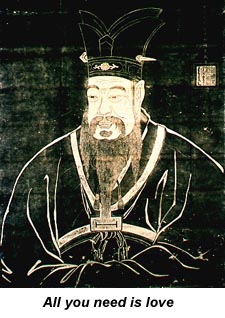The Confucian Businessman
By Douglas C. McGill
Editor-in-Chief

We are sitting in the sunlit faculty office of Ming-Jer Chen, a professor at the Wharton School in Philadelphia who happens -- his modest protests notwithstanding -- to be a direct intellectual descendant of the ancient Chinese philosopher, Mencius; of Sun Tsu, the 4th century B.C. military strategist; of the French philosopher Voltaire; of the American revolutionary figure Thomas Paine; and of the modernist poet, Ezra Pound.
|
"China needs something to hook things together, to balance between Western economic capitalism and the traditional Asian way of thinking."
|
Professor Chen isn't penning poems, plays, and military tracts on his nights and weekends. A single aspect of his forbears' careers is Chen's all-consuming mission: to make the teachings of Confucius, the ancient Chinese sage, relevant and useful in the modern age.
Earlier scholars read Confucius with an eye to their own eras, while Chen is extracting a motherlode of insights he believes can humanize the dominant mode of 20th century life: doing business in the global economy.
"If we truly apply Confucist thinking it will improve the globalization process,"
Chen says. "It adds the idea that profit-making is only one of many business and organizational goals. From a Confucist perspective the ideal business person is one who is constantly trying to balance his business requirements with his humane ideals."
Staying Power
For business people in the West, Chen says, there is no better place to start learning about China than the teachings of Confucius.
"Confucius is relevant and useful," he says. "His ideas have long been a part of Chinese life, and his influence is pervasive. Confucianism has also been directly responsible for the survival and the success of Chinese businesses around the world."
Confucian scholars sometimes note how passing strange it is that the vaguely-worded thoughts of an obscure teacher, who was never listened to by the Imperial Court in his lifetime and who died believing himself a failure, should have such staying power throughout human history.
After all, there is nothing in Confucianism, as there is most other world religions and belief systems, that is electrifyingly memorable -- like Buddha reaching enlightenment under the Bodhi tree, or Socrates asking only questions to make a rhetorical point, or Jesus Christ accepting death on the cross to atone the sins of all mankind.
Confucianism, by contrast, is a gently elusive tissue of teachings that argue for moderation, introspection, and self-restraint. The Analects, Confucianism's central book, is a loose collection of the master's often cryptic sayings -- more of a Bartlett's than a Bible. The central teaching
of Confucianism is love for one's fellow man, called "ren" in Chinese, but it's a love best expressed in no more dramatic a behavior than listening carefully to other people, making an effort to understand them, and carrying out one's family and civic duties.
Continued
|



